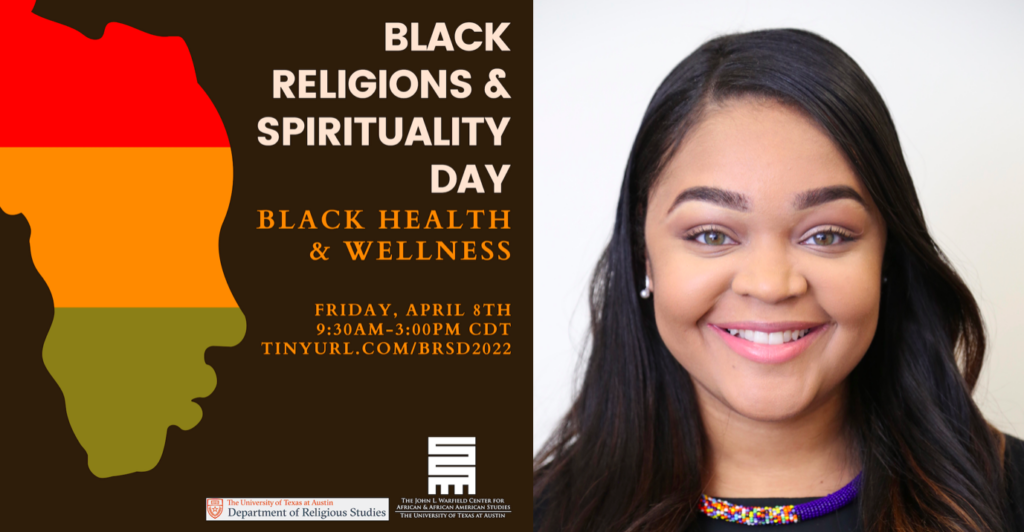By Drake Konow

When Religion and Society Ph.D. student Jade Evans saw that UT’s Warfield Center for African and African American Studies hosted “Yoruba Day,” a day to celebrate Yoruba culture and religion, she had an idea. What if there was a day to honor a myriad of Black religious and spiritual expressions across the African Diaspora? It was from this question that UT’s first Black Religions and Spirituality Day emerged.
Evans, who is also a Warfield Center Fellow, developed the program vision and served as the program curator. She worked together with Warfield Center Director Jennifer Wilks and Senior Coordinator Christina Bryant to bring this vision to life. On April 8th, UT Austin observed Black Religions and Spirituality Day (BRSD) with a daylong conference co-sponsored by the Warfield Center and the Department of Religious Studies.
The vision for Black Religions and Spirituality Day clusters around three objectives: to amplify Black and African Diasporic religious traditions and culture, expand interdisciplinary discourse and inquiry on Black and African Diasporic religious traditions and culture, and bridge the gap between community and academy by centering diverse sources of knowledge.
For Evans, Black Religions and Spirituality Day was “an opportunity for individuals of diverse academic disciplines, religious doctrine, and social and political domains to consider the impact and implications of religious phenomena in society. By focusing on religiosity from within the African Diaspora, BRSD prioritized the religious and spiritual cultures of folk not often centered in secular and predominantly white institutions such as UT Austin.”
This year’s theme “Black Health and Wellness” brought together a range of scholars, religious practitioners, artists, and students both within and beyond the university.
The day began with a panel on African Diasporic religion and care for Black bodies. The panel included Religious Studies professor Dr. Khytie Brown, UT’s Associate Director for Student Learning and Development and Christian minister Dr. Brandon Jones, UT History Department graduate student and Hoodoo Devotee Niria White, and Yoruba and West African ritual specialist and artist Iya Nailah I. Akinyémi-Sankofa.
BRSD also welcomed theologian and essayist Candice Marie Benbow for a book talk. Benbow is author of the recently published Red Lip Theology: For Church Girls Who’ve Considered Tithing to the Beauty Supply Store When Sunday Morning Isn’t Enough (2022). “Blurring the boundaries of righteous and irreverent” according to the publisher’s description, Benbow’s book seeks to “reimagine how faith can be a tool of liberation and transformation.” Benbow writes about progressive Christianity, Black womanhood, sexuality, and activism and draws from alternative spiritualities, Womanism, and commitments to body positivity and LGBTQ+ rights.
In the afternoon, artist and theologian Carmelle Beaugelin introduced participants to the Haitian folk medium of Vodou flags and iconographic representations of Ezili. With this background, she invited all into a time of creativity and reflection, what she called “Creatio Divina.” Beaugelin encouraged participants to experience this as a time of radical silence, care, and rest—asking open-ended questions to the spirits, guides, the divine, or of oneself.
The closing keynote was delivered by Dr. Elise Edwards, a Black feminist ethicist and theologian who teaches in Baylor University’s Department of Religion. Edwards’ work resides at the intersection of theology, ethics, architectural theory, and aesthetics. Focusing on “cultural expressions by, for, and about women and marginalized communities,” her research and forthcoming book Building Justice: Theological Commitments in Architectural Design (Lexington Books) ask how religious “beliefs and commitments are expressed publicly” through elements of space and design. Edwards’ keynote addressed this topic focusing on “black liberation as inspiration for design” considering especially spaces of “healing” and “flourishing.”
Reflecting on the inaugural Black Religions and Spirituality Day, Evans said, “The coming together of a wide array of perspectives from across African Diasporic traditions contributed to the success of the inaugural BRSD.” Indeed, speakers represented Vodou, Hoodoo, Yoruba, and various Christian denominations.
For Evans, “The event provided something for everyone—from cross-disciplinary dialogue to interactive activity to traditional lecturing—despite the limitations of a virtual format. Personally, the way attendees were excited to engage with event speakers who gracefully made space and time for difficult questions was most impactful.”
Drake Konow is a Ph.D. student at The University of Texas at Austin’s Department of Religious Studies, concentrating on Religion in the Americas. His research focuses on the relationship between religion, capitalism, and popular culture. He also has interests in queer studies in religion, critical theories of religion, and religion in contemporary Brazil.
Jade Evans is a first-year PhD student at The University of Texas at Austin’s Department of Religious Studies, concentrating on Religion and Society. Her research interests include religion and anti-black violence, African Diasporic religions in the US and the Caribbean, and postcolonial approaches to the study of religion.
